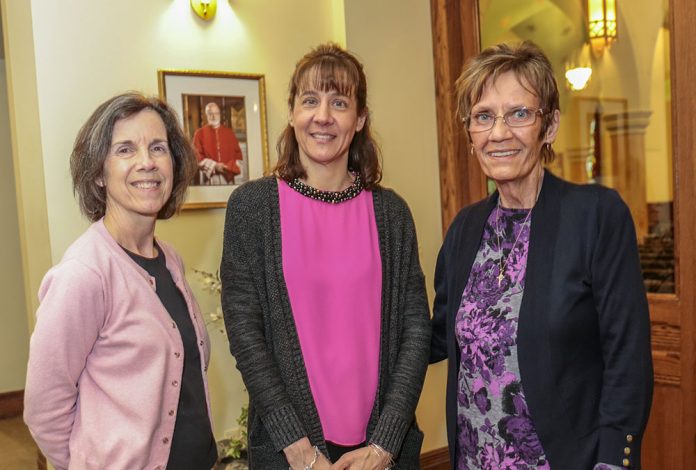
by Dan Thomas, Janet Schaeffler, Chris Weber
What are some guidelines for determining a topic and a guest speaker?
Q: Our pastor is insisting that next year, every catechist in our religious education program bring in a guest speaker at least once during the year. I understand this methodology but I need to help the catechists understand it. What pointers might I include in a guide that I develop for them about how to determine a topic and select a speaker?
—DRE in Boise City, ID
Dan Thomas’s Answer
A: There certainly is value in having guest speakers share their Catholic faith with students. A different perspective is often helpful. Planning for guest speakers, however, creates a key concern: Due to the limited number of sessions most parishes have and the textbook material that needs to be covered, scheduling a week or two for guest speakers can mean fewer weeks for catechists to cover required material.
One approach to address this concern would be to fit the speaker into one of the scheduled topics for the year. This would be a good point to include in your guidelines.
To determine a topic for a guest speaker, consider issues or interests that you want to cover: respect life, personal prayer, or pilgrimages. Bringing in guest speakers to speak about these topics and interests will help you offer valuable information to students and it can generate renewed interests on the part of the students.
Also consider scheduling speakers during the seasons of the liturgical year. It might be valuable to have someone share his or her experience observing Advent, Christmas, Lent, or Easter in another culture or discuss some of the customs that various parish families have in their homes.
This is an intriguing situation in which you find yourself. From the way your question is stated, it seems that the pastor did not explain clearly what his reasoning was for requiring guest speakers. You might talk to him about why he thinks this is important. It doesn’t seem like you fully understand his rationale.
Also, I am curious about why you were not consulted about this. You are the catechetical expert in the parish, and your insights are important in decisions relating to your program. This, too, is worth exploring with your pastor.
Dan Thomas served in catechetical leadership for over 30 years and remains involved in the National Conference for Catechetical Leadership (NCCL). He and his wife, Eileen, are the parents of two adult sons.
Janet Schaeffler’s Answer
A: Having guest speakers address your students is a good idea; there are many advantages to it. However, as with most things, we shouldn’t do it simply for the sake of doing it. It needs to “fit.”
You’re very wise to guide your catechists in their choice of determining what and who.
Perhaps a first step might be in the original presentation of this idea. Be sure it is part of your first catechist orientation meeting in August or September. At that time, emphasize the pastoral staff’s careful evaluations of the catechetical program and its commitment to enhancing the program—pointing out that having guest speakers address students is one way to enhance the program.
Rather than presenting this as a “directive” or a “must do” from the pastor, suggest that there are many advantages to this practice, i.e., children/youth have the opportunity to be surrounded by many different witnesses and disciples who are living their Catholic faith. Then, rather than pointing out other advantages, invite catechists to brainstorm the benefits they see to this creative addition to the program. This will give them more ownership in the practice.
Here are some guidelines/steps for catechists as they plan for this practice:
* Plan early. Do not wait until the last minute to invite a speaker just so you can meet this requirement. Review the syllabus and the themes for each session. What topic lends itself to the experience a guest speaker could offer?
* Consider the qualifications of potential speakers. Once you’ve decided upon topics to be explored, ask yourself (and others) who in your parish, diocese, community, etc., has the experience and expertise to share with your learners? Specifically, does a potential speaker have the ability to communicate with and respond to the age level with whom he or she will be meeting?
* Meet with speakers ahead of time. Discuss with them what it is you’re asking them to share with your students, and review all the details about when the session meets, where it meets, and for how long. Answer any of their questions. Share with them what the students have been studying and how the speakers’ visits fit in with your current topic(s). Let them know, too, a little bit about your students: what interests them, the ways they prefer to learn, the kinds of discussions they seem to enjoy, etc.
* Prepare your students for the visit. Explain to them how the topic and speaker fit with what they’re studying. Offer a little background on the person who will be coming, and brainstorm questions they might want to ask.
* Thank the guest speaker. After the visit, invite students to send notes to the speaker, thanking him or her for taking the time to share with them and for helping them learn more about their Catholic faith and the community of disciples to which we all belong.
After many years in parish and diocesan catechetical ministry, Janet Schaeffler, OP, is currently involved in catechetical/adult faith formation consultation, writing, workshops, days of reflection/retreats, and teaching. Her website is janetschaeffler.com.
Q: How can we combine grades and team-teach from the same text?
Q: Our program has always been small, but due to economic factors, enrollment is lower than ever. In several grade levels, we have five or fewer students registered. The catechists tell me they don’t want to teach such small classes—the discussions aren’t fruitful and the activities are less fun with such a small group. They want to double up for next year—putting two grades together—and team-teach from the same text. What do you Master Catechists think of this, and what are your suggestions for working out the logistics?
—J. M., Diocese of Madison, WI
Chris Weber’s Answer
A: I have heard of cases where parishes in a similar situation have combined classes for the same reasons that you mention. However, I do not recommend teaching two grades from the same textbook, particularly in the elementary and intermediate levels. Differences in child development from year to year are significant enough that this could cause a great deal of consternation for students and catechists alike.
However, necessity is the mother of invention. This situation makes it necessary to invent a different model. I make this suggestion.
Instead of team-teaching, how about theme-teaching?
Instead of team-teaching from one textbook, theme-teach along the model of a workshop, or better yet, a retreat. This would require that you consolidate your sessions into longer blocks of two to three hours. Put two or more grades together, as you suggest, but instead of having catechists work from one text, have each one review his or her respective text to locate lessons that offer parallel themes.
Once catechists have determined common themes, use ideas from their respective textbooks to devise a general session where children from each of their classes will gather. Build regular ritual into this, like an opening song, prayer, and reading, or vary it each time so that students are caught off guard and wonder if they will do a craft, a skit, a song, a prayer, or a game.
After the opening session, students can break into class groups to work from their individual textbooks. This will ensure that your students are working with the material at a level appropriate to their age. Depending upon time and the compatibility of the groups, classes could merge again at the end to wrap it all up with prayer or another joint activity.
Theme-teaching provides the dynamic of larger group interaction and also allows you to maintain a developmental sequence in your curriculum. If you suddenly get enough students to run a stand-alone grade, you don’t have to be concerned about students repeating material from the previous year.
A merged retreat or workshop model (theme-teaching) will work particularly well if you use a spiral curriculum, where each grade revisits the same themes on a deeper level. If you are serious about merging classes in any fashion, a spiral curriculum will be a big timesaver for your catechists.
Chris Weber has worked in the field of catechesis for over 20 years as a catechist, a parish catechetical leader, and a diocesan staff member. He is the author of Jesus-Style Recruiting: A Fresh Look at Recruiting and Forming Parish Volunteers, published by Visual Dynamics Publishing. He is currently Director of the Mount Summer Program at Mount St. Mary’s University in Emmitsburg, MD.
Kate Ristow’s Answer
A: Doubling up is a great idea and team-teaching varies the routine of class sessions no matter how creative an individual catechist might be. The only tricky thing is how to use the texts so that none of the children are learning from a book they already completed the previous year. Here’s how you do it:
Pair the kids up with the next-closest grade level—first grade with second grade, for example. The first year you apply this model, use the second-grade text, since your “true” second-graders have completed the first-grade text. Your catechists may have to do more “read alongs” and “read alouds” because many first-graders are just learning to read, but this is the only level where you’ll have that potential problem.
Then, next year, when this year’s first-graders are second-graders apired with first-graders, use the first-grade text. In other words, simply alternate the grade-level text that the two paired grades use each year.
You might be thinking about what this will do to your sacramental preparation programs. I come at this with the bias that parents always should be responsible for preparing their children for First Reconciliation and First Eucharist using separate, stand-alone programs, so I do not envision this affecting your programs at all. (And, no, I do not mean you just hand them the books and send them on their merry way. They need support. They need a schedule to follow, and they need ongoing progress assessments—something simple like the kids bringing their books to class and having the catechist or DRE page through the completed lessons and adding religious stickers and affirming notes here and there).
However, I know others see this differently. In that case, you might schedule separate sacramental preparation sessions for the second-graders, outside of their regular religious education classes. Some of the parents will be unhappy with this because of scheduling difficulties, but you might then offer them the option of preparing their child at home—and supplying them with the resources they’ll need. I’ve found that most parents really do a great job, and enjoy forging a very special bond with their child through the experience.
What concerns me is that you have this “problem” because finances (I imagine tuition and fees) have kept people from enrolling their children. Does your pastor know this? Is your parish religious education board aware of the situation? Money should never, ever prevent a child from receiving faith formation. Can you offer a scholarship program funded by a special collection and a couple of bake sales? I mean, really!
And perhaps I am just too jaded, but I’ll bet you anything parents are somehow finding the bucks for soccer, skating, and baseball fees and uniforms. Perhaps it’s time for a priority reassessment and a reality check!
Kate Ristow, Contributing Editor to CATECHIST, has worked in Catholic publishing for over 25 years as a national speaker and writer, building on a wealth of experience in the religious formation of children and catechists in both parish and Catholic school programs.
Copyright 2012, Bayard, Inc. All rights reserved. This article is protected by United States copyright and other intellectual property laws and may not be reproduced, rewritten, distributed, redisseminated, transmitted, displayed, published or broadcast, directly or indirectly, in any medium without the prior written permission of Bayard, Inc.




